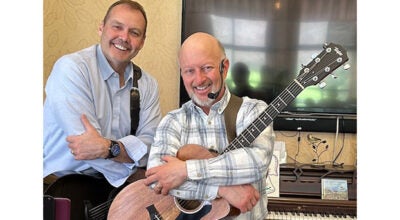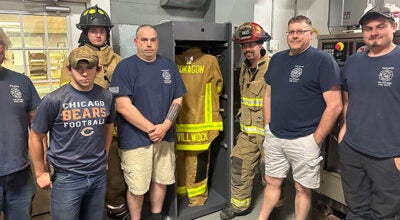Miss Southwest stresses importance of mentoring
Published 8:00 am Friday, July 10, 2015

Miss Southwest Michigan 2015 Sarah Punches shares her message about the impact that mentorships can have on the lives of struggling children with the members of the Dowagiac Rotary Club during their meeting Thursday afternoon. (Leader photo/TED YOAKUM)
The message that Miss Southwest Michigan 2015 Sarah Punches has advocated since being crowed nearly a year ago wasn’t something she chose because it sounded good on paper.
When Punches talks about the importance that a one-to-one mentorship can have in the life of a child, it comes from her own experiences, she said. The 2014 graduate of St. Joseph Public High School struggled with math and reading during her first few years of school, being placed in special education classes to help bring her up to par with classmates.
It was through a group of people investing their time to her success that helped her overcome her difficulties, Punches said.
“I had teachers step up and be more than just teachers,” she said. “They became mentors. They helped me to decide what I want to be when I grow up. They helped me to have a purpose in life. They me decide who I wanted to be.”
The local royalty shared her platform, “Mentoring: Power of an Hour,” with the members of the Dowagiac Rotary Club during their weekly meeting Thursday afternoon at the Elks Lodge. In her presentation to the club, Punches talked about the mentorships she developed during her high school years, as well the effects that taking a personal investment in the life of a young child can have on their future.
Punches first got involved with mentoring during her freshman year of high school, enrolling in a program through her district that allowed her to work with students with Autism Spectrum Disorder, she said. From there, she expanded her volunteer work to other local programs designed to help children with learning disabilities.
Some of the students she worked with over the years she remains in contact with today, Punches said.
“That relationship you make with that individual will last forever,” she said. “I know that the mentors I’ve had, even when I was in first grade, to this day I can still remember what they did for me and the impact they left, and that’s something that’s encouraging.”
Punches shared some figures about the ways that mentoring benefits the lives of children. According to a 2001 study, 46 percent of mentored youth are less likely to use drugs, 33 percent less likely to commit violent acts, 64 percent more likely to achieve higher grades, and 65 percent more likely to improve their relationships with peers.
The intangible benefits of mentorships are also valuable for both the mentored and the mentor Punches said.
“Just knowing that you’re special to someone else just gives you the purpose and the heart to keep going in the worst of times,” she said.






